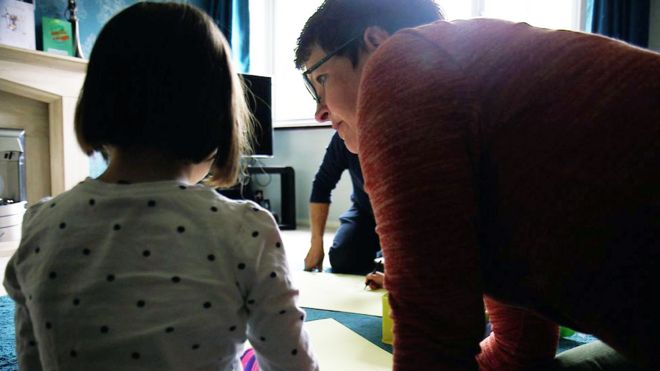
Diane says her daughter "can't cope if she's not the centre of my world"
Full news item available on the BBC website here.
Children who have suffered abuse and neglect can often become violent and distressed at the thought of being loved, developing attachment issues. Some adoptive parents say they are left unprepared and unsupported when trying to care for them.
"Her anxiety level can go through the roof," Diane tells the BBC's Victoria Derbyshire programme. "Trying to go through the school door into the classroom she can have a panic attack."
Diane and her partner Adrian adopted their daughter, along with her brother, two years ago.
Both had been neglected by their birth parents, which is thought to have led to their daughter having severe attachment issues.
"She can't cope if she's not the centre of my world," explains Diane - whose full name we are not using for safeguarding reasons.
"She either has a hissy fit or will do something like put a finger up her nose and make it bleed, so I have to stop what I'm doing and attend to her."
There are different forms of attachment issues, often down to trauma experienced during childhood.
Many children are at first afraid of being loved, but then once shown affection, they are fearful of it going away.
Diane's daughter has now been diagnosed as having "anxious-ambivalent attachment", which sees children become distressed when separated from their carer but also resist contact when the carer returns.
On some days, Diane says, her daughter can be "clinging to the school railings sobbing her heart out, refusing to leave the school grounds" when she picks her up at home time.
"So I end up sitting in the middle of the school driveway rocking her, with her sucking my finger like a dummy, me singing a lullaby, and all the other parents walking round me wondering what on earth I'm doing.
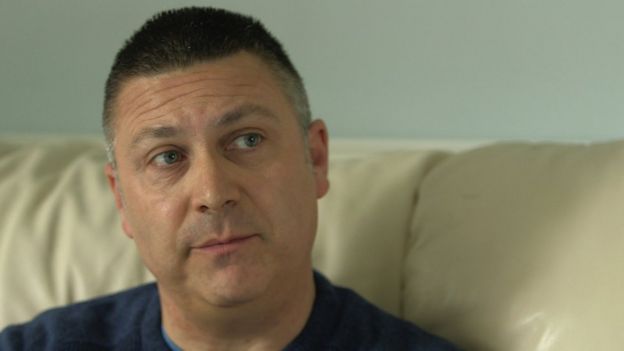
Adrian says they were given "limited" background information about the children when they adopted them
It is estimated that three-quarters of the 70,000 children in the UK care system have suffered abuse or neglect.
This leaves them more likely to develop behavioural problems, fall behind at school, and in later life become alcohol or drug-dependent and go to prison.
Adoptive parents, teachers and charities have all told the Victoria Derbyshire programme they believe many of the reasons these problems develop is because the children have attachment issues and their behaviour is misunderstood.
They also say parents are not being prepared for this when they adopt.
Adrian says that with their two children, "the background information we had was quite limited - it was more about the birth family than the children themselves".
It was a year before they were able to get the children assessed and for them to be seen by a therapist.
"The only advice we were given was to go to parenting classes. But they're for bad parents, not for parents who've adopted children with complex emotional needs."
Attachment
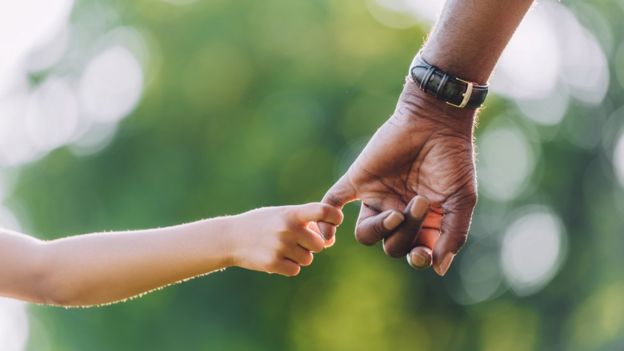
Visit the 'Our Services' page on the PAC-UK website to see how we can help you with these issues
- Forty per cent of children have some form of attachment issue, it's estimated.
- More than 10% of children have an avoidant attachment, because their parents were dismissive of them. They can be clingy but also avoid physical contact by appearing to deal with their own distress.
- Another 10% have an ambivalent attachment, which develops as a result of inconsistent parenting. These children become distressed when separated but also resist contact when a care-giver returns.
- About 15% have a disorganised attachment, mainly resulting from abusive parents. They seek physical contact but approach it looking fearful. They often appear dazed or can completely freeze.
- Attachment issues can also arise if a parent or young child becomes ill, such as through postnatal depression, or if a child's parent dies.
Another adoptive parent who felt "very let down by the system" was Daniela Shanly.
She says that while her son's mainstream school tried as hard as it could to support him, teachers did not have the training, resources or the time needed.
"The first time teachers hear about [issues surrounding] attachment is when they have a child in their class whose needs they can't understand," she says.
The Department for Education says schools "receive £2,300 of funding for each child adopted from care, to make sure they get the support from their education that they deserve".
"From September, schools will be required to appoint a designated teacher for children adopted from care to help them at school," it adds.
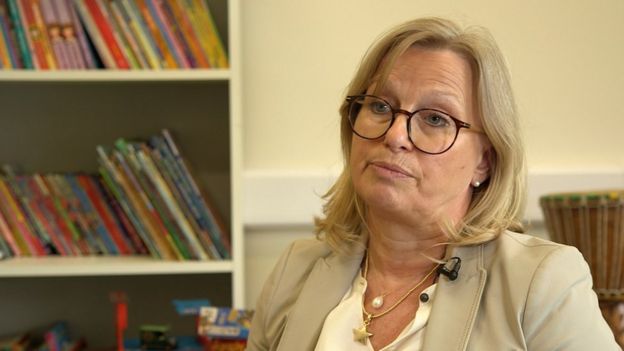
Daniela Shanly says mainstream teachers are not prepared for children with attachment issues
Ms Shanly has now set up Beech Lodge School in Maidenhead, Berkshire, which is one of only a few schools in the UK that specialises in children with attachment issues.
One of the school's pupils is Mary. She was put into care at just three years old, and had two different foster families before being adopted.
She is now 16 and recognises she had severe problems with attachment.
Mary says her birth mother was violent towards her - an experience that left her "scared of the outside world".
"I didn't want to be by myself - I was afraid something was going to happen to me. I just played up all the time."
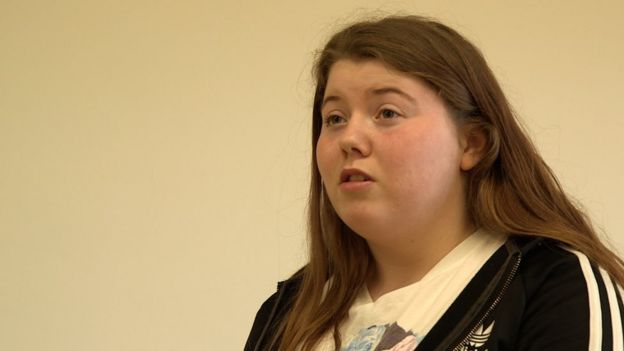
Mary says she always feared she was going to be left alone
Mary went to mainstream school but says she hated it. "Lots of people were being naughty, and I was naughty with them," she explains, regretting her time there.
"I always thought I was going to be left alone, so I just went against everyone's idea to get me happy."
Now at Beech Lodge, she says she likes to go out and explore life - and even wants to begin travelling.
'Unable to sleep'
The charity Adoption UK says that while all adoptive families have the right to an assessment of their child's needs, "this is often not happening, and where assessments are made, appropriate support is not always readily available".
"Adoptive families are passionate advocates for adoption, and are experts in parenting some of the UK's most vulnerable children. We need to listen carefully to the things they tell us they need," it adds.
Diane and Adrian hope change will come soon.
They say adopting their children was the best thing they have ever done but the experience has affected Diane's mental health.
"I've been put on anti-depressants for the first time ever in my life," she says.
It has also left her unable to sleep and she has quit her job.
"Parents need respite, first and foremost," she says. "This is an extremely difficult job.
"But we also need access to proper funding so we can send our children to get proper therapy."
Watch the BBC's Victoria Derbyshire programme on weekdays between 09:00 and 11:00 on BBC Two and the BBC News channel.





